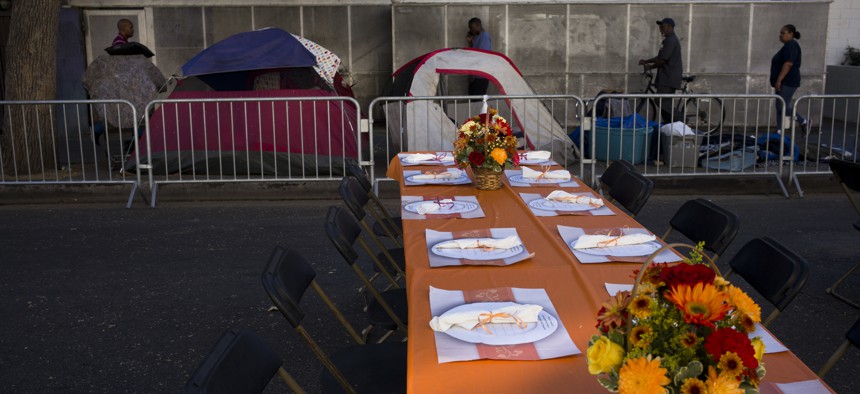Amid Crackdowns on Homeless People Living Outside, Group Appeals Food Sharing Case

Homeless tents are pitched on a sidewalk in the Skid Row area of downtown Los Angeles Wednesday, Nov. 22, 2017, as tables are set up on the street to serve dinner to homeless people at the Los Angeles Mission's Annual Thanksgiving Dinner Celebration. AP Photo/Jae C. Hong

Connecting state and local government leaders
Food Not Bombs is appealing the latest ruling in a case that challenged restrictions on sharing food with the homeless in Fort Lauderdale, Florida.
Allowing groups to share food with the homeless in a city park could lead to secondary problems comparable to those fueled by adult movie theaters, a federal judge wrote earlier this year in an opinion upholding a Florida city’s ability to restrict such activity.
A group that had been holding weekly food sharing events in Fort Lauderdale is now appealing that decision, arguing that the city will stifle their First Amendment rights if it restricts where or with whom they break bread.
Food Not Bombs, an anti-war activist group, regularly hosted vegan and vegetarian shared meals with homeless people in Fort Lauderdale’s Stranahan Park’s gazebo without incident until the city passed an ordinance in 2014 banning the practice in parks. The law imposed certain food safety and safety requirements for those distributing meals and, for a short period, the city issued citations to people who participated in food sharing events, earning widespread criticism.
Members of Food Not Bombs, a national group founded in Massachusetts 30 years ago, share meals as a means of political expression, and believe resources spent on war should be redirected to address homelessness and hunger.
“They share food not as a charity, they see it as an act of political solidarity,” said Kirsten Anderson, an attorney with the Southern Legal Counsel, who is representing the group.
The group filed a lawsuit to challenge the ordinance in 2015. Last year the 11th U.S. Circuit Court of Appeals ruled in the group’s favor, finding that their events were expressive conduct, but it remanded the case back to a district court judge to determine whether the city ordinance was a violation of the First Amendment.
In August, U.S. District Judge William J. Zloch sided with the city, writing that preventing Food Not Bombs from sharing food “as a social service in certain venues is not an attack on their rights of expressive association.”
Zloch compared the city’s desire to regulate the food sharing activities to a previous Supreme Court ruling that upheld a zoning ordinance restricting adult film theaters, “not because of the content of their films but in order to ‘prevent crime, protect the city's retail trade: maintain property values' and generally maintain 'the quality of urban life.’”
Under the city’s ordinance, the group and other members of the public were free to take part in any demonstrations, he said.
“The fact that a restriction is placed on a particular method of expression at said demonstrations does not impair this freedom of association,” Zloch wrote.
In its appeal filed Friday, Food Not Bombs argued that Zloch was incorrect in determining that the group’s actions were not “inherently expressive.” They also pushed back on the insinuation that the city had a right to regulate their actions due to concern over possible secondary effects, such as crime.
The Fort Lauderdale City Attorney’s office did not return calls seeking comment about the case. But in previous court filings, the city indicated that it had repealed the law regulating health and safety standards in outdoor food distribution centers. Further, the city defended another rule banning social services like distribution of food or clothing in parks without the city’s permission, writing in a November 2018 filing that rule “does not purport to regulate speech, protests or other forms of expressive activity.”
“While it is true that any type of conduct may involve some sort of expressive activity or purpose, First Amendment protection is extended only where the conduct is intended to convey a particularized message, a reasonable person would interpret the conduct as some sort of message and explanatory speech is not necessary or the reasonable observer to perceive a message from the conduct,” wrote an attorney representing the city.
Bans on food sharing have not been particularly popular across the country, according to the National Law Center on Homelessness and Poverty. The center’s survey of 187 cities in 2016 found that 6% of cities had such bans.
Most often, cities seek to regulate food distribution under the auspices of health and safety concerns, said Eric Tars the center’s legal director.
Groups that have challenged such restrictions or outright bans have been most successful defending their actions under the First Amendment when their organizations are distributing food as part of religious expression, he said.
“The area where there has been lack of clarity is on the non-religious groups side, like Food Not Bombs, that do it in part as a protest,” Tars said.
More recently, cities have pursued camping bans as a means to prevent homeless people from sleeping on the streets. City and state governments are urging the Supreme Court to hear a case stemming from a camping ban in Idaho. Meanwhile the Trump administration has advocated for more aggressive intervention by law enforcement to address problems posed by large concentrations of homeless people living on the streets.
“What all of these things have in common is the true target is the visibility of homelessness in a public space,” Anderson said. “The reason why groups such as our clients are being singled out is this idea that by sharing food in a public space that they are attracting homeless people to a public space or at a minimum making homelessness very visible in a community.”
Andrea Noble is a staff correspondent with Route Fifty.

NEXT STORY: Drug Deals And Food Gone Bad Plague Corner Stores. How Neighbors Are Fighting Back.




